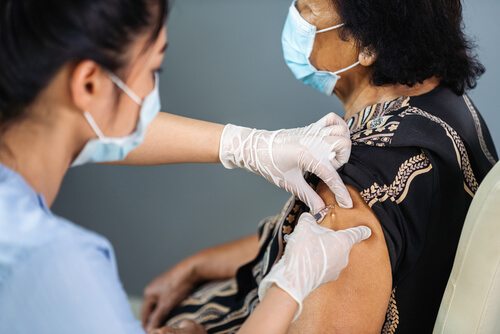
Page contents
Page contents
For information on the autumn 2023 Covid-19 booster vaccination, please see our article here.
Around 850,000 people in the UK live with dementia. For many, this could make understanding Covid-19 and being vaccinated against it challenging, but no less important. Dementia can make it hard for people to understand or remember new information, while some can have behaviours that can make administering the vaccine difficult.
Below is some guidance and ideas for how you can support a loved one with dementia to get the all-important vaccine.
Explaining the vaccine
There are many innovative ways to explain the coronavirus pandemic to somebody with dementia, in fact we’ve written a whole article about it here.
When explaining the Covid-19 vaccine to somebody with dementia, you can use similar tactics to help them. Understanding what the vaccine is and why it’s important will help them to make an informed decision as to whether they want to be vaccinated, and reduce any distress.
A potential strategy for explaining the vaccine could be:
1. Gather visual material ready. This could be their letter inviting them to book a vaccination appointment and leaflets such as this one from the NHS. If you cannot see them in person due to lockdown, you could make sure that these are posted and ready when you phone.
2. Choose a good time. Your loved one may find their dementia symptoms are lesser in the mornings, when they are not tired, or at a time when they are in a good mood. Also make sure that you have time, as they may take a while to understand and need to repeat information with you a few times.
3. Speak clearly and warmly, and be careful not to overwhelm them. Too much information at once can be jarring for somebody with memory problems. Be concise and allow them plenty of time to speak, as this will help them to engage in the conversation and with what you’re saying.
4. If they have questions, you could make notes of the conversation, with questions and answers for them to look at when you’ve gone.
5. Give them time and space to make their decision, but not so long that they forget or start to worry. You could say, “I’ll remind you about this tomorrow and we can have another chat on Sunday to see how you feel about it and what you’d like to do.”
6. If they decide they do want the vaccine, support them to make and attend the appointments, or keep them involved and updated if you are arranging it for them.
7. After they’ve had the vaccine, keep in touch with them to monitor any side effects they may experience. They might forget they’ve been vaccinated and not know why they feel ill, or not recognise side effects that they should see a doctor about.
Arranging the vaccine
Supporting your loved one to book their vaccination ensures that you know where they need to be and when, thereby avoiding any mixed messages or forgotten dates. Your loved one must be registered with a GP to book a vaccination. You can book it through the centre administering the vaccine, or via the NHS website.
You’ll need their NHS number to hand when you book, which will be at the top of their medical letters, or on a medication prepayment card if they have one.
To help them remember when their vaccine is:
- Get them to write it on their calendar and in their diary while you’re there. The act of writing it themselves will help them to remember.
- If they are anxious, have it written down for them when you will pick them up (if you are), where they are going and what they need to have ready. You could include reminders for the day such as to wear a t-shirt or something with loose sleeves that can be rolled up.
- Remind them the day before that they are having the vaccine and talk through when you will collect them and why they are having the vaccine once more.
- It is possible that your loved one may become distressed at the vaccination centre or forget why they are there. You may be allowed in with them if you explain to the staff there that he or she has dementia.
Consent
Before receiving the Covid-19 vaccine, the person receiving it must sign a consent form. Even if your loved one has been diagnosed with dementia, unless they have been medically assessed and determined not to have the mental capacity to make their own decisions, it is still their choice as to whether they receive the vaccine or not. Even if you disagree with their decision, their free will comes first.
You may consent to (or refuse) the vaccine on their behalf only if you have a Health and Welfare Lasting Power of Attorney (LPA) in place, or you have been appointed their Personal Welfare Deputy by a court. If they have been assessed as lacking capacity, but you do not have express permission to make health decisions for them via an LPA or deputyship, the decision will be made by a healthcare professional.
